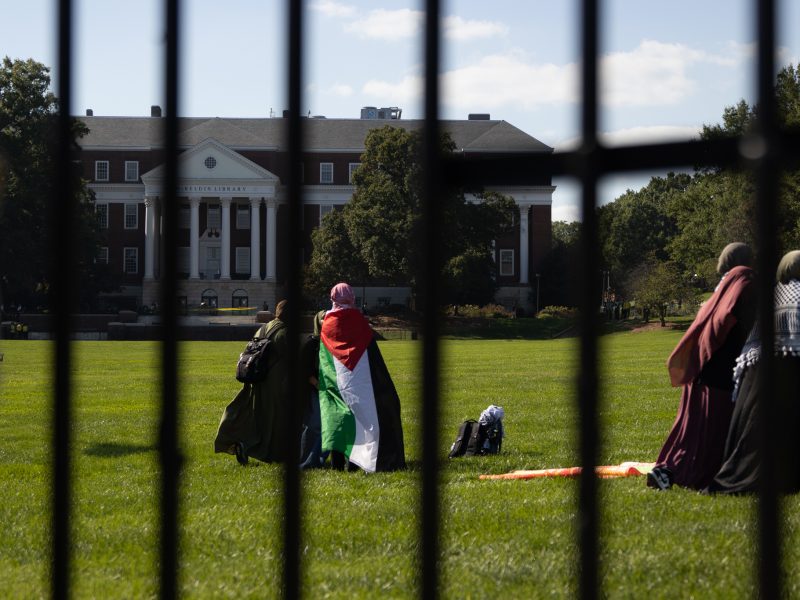
Terrapins fans
EDITOR’S NOTE: The name of a student has been withheld to avoid university sanctions.
The Comcast Center has nearly 18,000 seats, but that doesn’t mean every student fan gets a ticket.
It’s the basic property of economics: So long as there are students desperately hoping to attend the men’s basketball game against Duke, there will be people selling them tickets in a black-market manner.
And as this university’s days in the ACC come to a close, tickets to games against old rivals, such as Duke, North Carolina and N.C. State, are becoming more valuable.
Thanks to activity fees, students receive their tickets for free through a lottery system, and athletics department officials said they strive to keep it that way. The ticket policy explicitly states that students cannot transfer tickets or sell them to others. Each ticket is printed with the student’s name, and students must present a valid, matching ID at the gate. Athletic staff members use bar code scanners at the door to ensure each ticket is scanned only once — any duplicates will be rejected.
But some students are finding ways to get around the measures, and they’re making a quick buck in the process.
Using social media and word of mouth, students who fail to get tickets through the lottery system are able to connect with others who have tickets but don’t plan on attending games.
The day before the Duke game, Neil Ray, a sophomore enrolled in letters and sciences, decided to try to sell his ticket because he was feeling sick.
“I wasn’t looking forward to waking up early in the morning for the Duke game and standing in line and all that,” Ray said.
Another student offered him $100 for his ticket, Ray said, but the deal fell through when they couldn’t agree on a price. Ultimately, Ray kept his ticket and started feeling better by game time, but he said he saw many other students using Facebook to find or sell tickets.
“I don’t want to label it as wrong,” Ray said. “But maybe people have reasons like me, or some people might have acted quickly to make some cash.”
Some students alter the name on the ticket using Adobe Photoshop. Others cross their fingers and hope the Terp Hosts who take tickets won’t look too closely at the names in the pre-game chaos. For the Duke game, some reserved a ticket for the women’s game against Duke and changed “women” to “men.”
For $90, Matt, a freshman enrolled in letters and sciences, was able to purchase a ticket to the game and borrow that student’s ID so the names matched, he said.
“I knew that this was going to be the last time we might play Duke, and I did not win the lottery,” Matt said. “I think it’s awesome that it’s a big enough campus and a big enough student section that you’ll find someone who will sell you a ticket.”
While it might seem easy, student tactics aren’t foolproof, said Matt Monroe, Ticket Services director. Some students do successfully slip through the cracks when the staff gets overwhelmed, but others get locked out of the game.
“I have 12 [Photoshopped] tickets that were confiscated at the Duke game sitting on my desk,” Monroe said. “We caught a significant amount of students doing that at the Duke game that were denied access.”
Using another student’s ticket or ID to get into a game also violates the Code of Student Conduct. Photoshopping a ticket counts as forging a document and “knowingly providing false information.”
Students who are caught may be referred to the disciplinary board, face probation, be banned from future games and more, depending on the seriousness of the incident, said Student Conduct Director Andrea Goodwin. Compared to past years, the number of cases is down, Goodwin added, but the office still sees students accused of ticket fraud.
Though there’s nothing really to stop students from selling their tickets, Monroe said, the athletics staff tries to be proactive about catching forged tickets at the door. The tickets’ font is unique to the athletic department, so students aren’t easily able to replicate it.
“[Photoshopped tickets] are pretty easy to spot,” Monroe said. “Our staff members are instructed to look for those because at the premium games, we see that happening.”
Officials are considering allowing students to transfer tickets, Monroe said. Nothing is set in stone yet, but a free transfer system could appear as early as next fall.
A free transfer system would make the ticket-swapping process easier for students, such as sophomore psychology major Niké Alade, who wasn’t selected in the Duke game lottery.
When Alade and her friends weren’t able to find reasonable ticket prices, they decided to just watch the game on TV.
“[Students] were selling them really high. One guy said he was selling for 80 bucks, and I just said ‘no thank you,’” Alade said.
With some tickets going unused, Alade said it was frustrating to know her only option was to buy one, and she knew she wouldn’t even be guaranteed entrance. She said she’s had similar issues at other games and is tired of students opting to sell tickets instead of attending the game.
“I understand you want to make a quick buck, but there are other ways to make money,” Alade said. “If you’re not going to go, you should just release your ticket so someone else who really wants to can go. Other people will also just scan and leave — it’s unfair to those who really want to go and can’t get a ticket. It should be free for all students. You shouldn’t have to pay to go if you want.”


